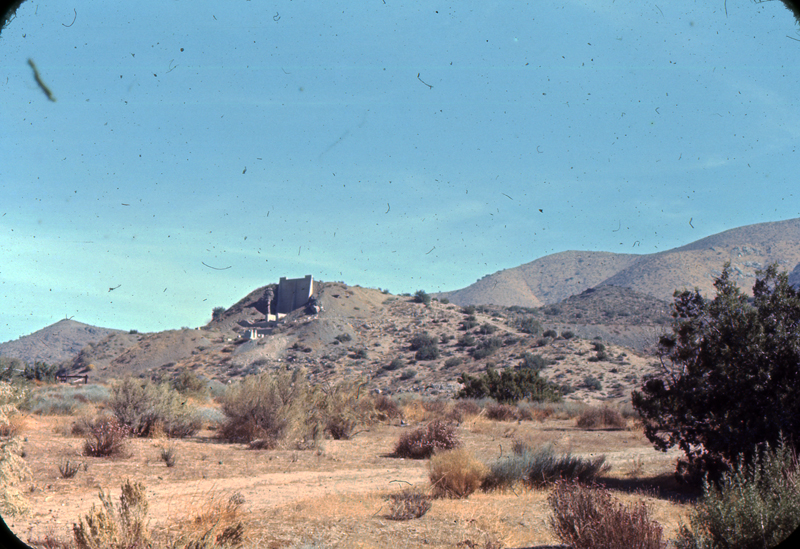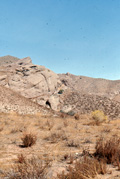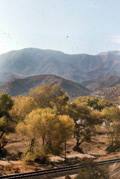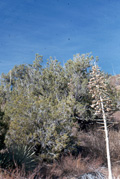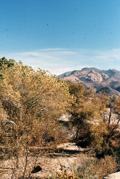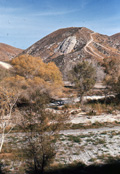Foundation of stamp mill, view from Soledad Canyon Road, November 1970
(hand-dated by photographer).
One in a grouping of color slides shot from Soledad Canyon Road in 1967-70, from present-day Canyon Country to Agua Dulce to Ravenna to Acton.
According to Vasquez Rocks docent Lisa Smith and to George Starbuck (of the Walker family in Placerita Canyon), this vertical concrete structure is
all that's left of the circa-1910 stamp mill (rock crusher) that was used to crush gold ore. It is located on Parker Mountain near the junction of
Soledad Canyon Road and Crown Valley Road. Starbuck remembers that the mill was still in place in the 1940s.
Most of the gold mined in Los Angeles County came from Acton. Mining activity near present-day Acton — first for copper, then for gold — started
in 1861 and continued to the early 1950s.
About the photographer:
James Krause was a 20-year-old art and history student at San Fernando Valley State College (now CSUN) when, in February 1967, his family moved to 19549 Fairweather St. in Saugus — later called Canyon Country. After graduating in 1968 and aspiring to become a teacher, James worked at the Flare-Northern division of the Atlantic Research Corporation in Saugus, a defense subcontractor that manufactured explosive devices for Sandia National Laboratories in Albuquerque, New Mexico. Flare-Northern was located at 19701 W. Goodvale Road, in the hills west of the Krause home.
Lucky for us, James enjoyed touring the canyons and shot numerous photographs from 1967-1970, focusing particularly on Soledad Canyon from present-day Canyon Country
to Acton, and on its Southern Pacific Railroad features. He shot many of the photos in November 1970 while on leave from Vietnam. His teaching pursuits had been derailed; he entered the Army on Nov. 5, 1968, and went through basic and infantry training at Ford Ord, Calif., followed by NCO training at Ft. Bening, Geo. In October 1969 he served as a staff sergeant with the 101st Airborne Division in the northernmost part of South Vietnam, operating from the DMZ to an area near the Laotian border. In November 1970 he transfered to the 14th Armored Cavalry (later the 11th Armored Cavalry) in West Germany, patrolling the border with East Germany until his discharge in March 1973. By that time, the earthquake of Feb. 9, 1971, had hit the Santa Clarita Valley and his family moved away from Saugus.
James' early interest in railroads was no passing fancy. Following his military service he joined the Union Pacific Railroad, first as a maintenance-of-way foreman for about a year and then as a locomotive engineer, a position he held until his retirement Aug. 29, 2011 (except for brief try at the restaurant business from 1992 to 1995). He drove trains in California, then Missouri and finally in Texas, where he lives as of 2012. He had three children with his first wife who, like James, was a Union Pacific Railroad engineer in Southern California. According to James, the UP believes they may have been the first husband-and-wife locomotive engineers in the United States.
JK0024: 9600 dpi jpeg from color transparency (slide) | Digital image only | Archival scan on file
